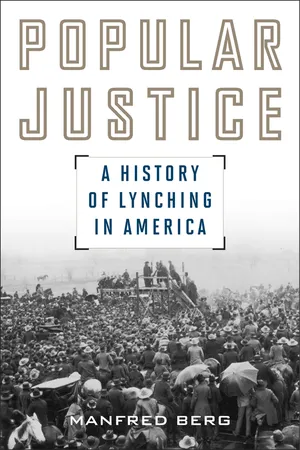
- English
- ePUB (mobile friendly)
- Available on iOS & Android
eBook - ePub
About this book
Lynching has often been called "America's national crime" that has defined the tradition of extralegal violence in America. Having claimed many thousand victims, "Judge Lynch" holds a firm place in the dark recesses of our national memory.
In Popular Justice, Manfred Berg explores the history of lynching from the colonial era to the present. American lynch law, he argues, has rested on three pillars: the frontier experience, racism, and the anti-authoritarian spirit of grassroots democracy. Berg looks beyond the familiar story of mob violence against African American victims, who comprised the majority of lynch targets, to include violence targeting other victim groups, such as Mexicans and the Chinese, as well as many of those cases in which race did not play a role. As he nears the modern era, he focuses on the societal changes that ended lynching as a public spectacle.
Berg's narrative concludes with an examination of lynching's legacy in American culture. From the colonial era and the American Revolution up to the twenty-first century, lynching has been a part of our nation's history. Manfred Berg provides us with the first comprehensive overview of "popular justice."
In Popular Justice, Manfred Berg explores the history of lynching from the colonial era to the present. American lynch law, he argues, has rested on three pillars: the frontier experience, racism, and the anti-authoritarian spirit of grassroots democracy. Berg looks beyond the familiar story of mob violence against African American victims, who comprised the majority of lynch targets, to include violence targeting other victim groups, such as Mexicans and the Chinese, as well as many of those cases in which race did not play a role. As he nears the modern era, he focuses on the societal changes that ended lynching as a public spectacle.
Berg's narrative concludes with an examination of lynching's legacy in American culture. From the colonial era and the American Revolution up to the twenty-first century, lynching has been a part of our nation's history. Manfred Berg provides us with the first comprehensive overview of "popular justice."
Frequently asked questions
Yes, you can cancel anytime from the Subscription tab in your account settings on the Perlego website. Your subscription will stay active until the end of your current billing period. Learn how to cancel your subscription.
No, books cannot be downloaded as external files, such as PDFs, for use outside of Perlego. However, you can download books within the Perlego app for offline reading on mobile or tablet. Learn more here.
Perlego offers two plans: Essential and Complete
- Essential is ideal for learners and professionals who enjoy exploring a wide range of subjects. Access the Essential Library with 800,000+ trusted titles and best-sellers across business, personal growth, and the humanities. Includes unlimited reading time and Standard Read Aloud voice.
- Complete: Perfect for advanced learners and researchers needing full, unrestricted access. Unlock 1.4M+ books across hundreds of subjects, including academic and specialized titles. The Complete Plan also includes advanced features like Premium Read Aloud and Research Assistant.
We are an online textbook subscription service, where you can get access to an entire online library for less than the price of a single book per month. With over 1 million books across 1000+ topics, we’ve got you covered! Learn more here.
Look out for the read-aloud symbol on your next book to see if you can listen to it. The read-aloud tool reads text aloud for you, highlighting the text as it is being read. You can pause it, speed it up and slow it down. Learn more here.
Yes! You can use the Perlego app on both iOS or Android devices to read anytime, anywhere — even offline. Perfect for commutes or when you’re on the go.
Please note we cannot support devices running on iOS 13 and Android 7 or earlier. Learn more about using the app.
Please note we cannot support devices running on iOS 13 and Android 7 or earlier. Learn more about using the app.
Yes, you can access Popular Justice by Manfred Berg in PDF and/or ePUB format, as well as other popular books in History & Early American History. We have over one million books available in our catalogue for you to explore.
Information
Table of contents
- Preface
- 1: The Roots of Lynching in Colonial and Revolutionary North America
- 2: The Rise of Lynch Law in Antebellum America
- 3: Frontier Justice
- 4: Lynching, Riots, and Political Terror in the Civil War Years
- 5: “Indescribable Barbarism”
- 6: Popular Justice Beyond Black and White
- 7: The Struggle Against Lynching
- 8: From Lynching to Hate Crime
- 9: Lynching in American Memory and Culture
- A Note on Sources
- About the Author